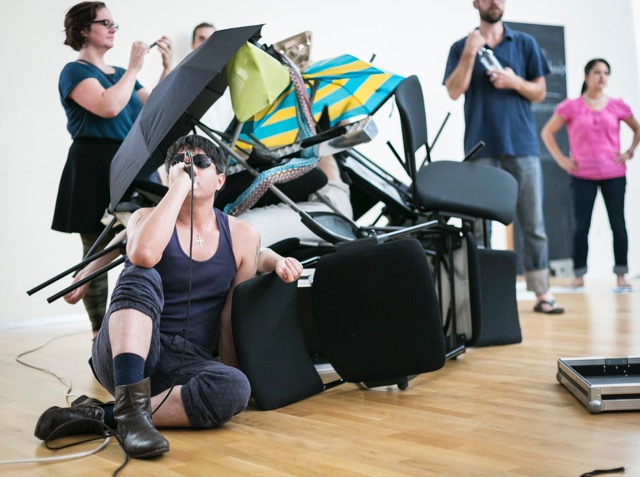
The Transart experience
– Summer intensives in Berlin, winter sessions in New York City for both MFA AND PhD.
– Workshops, seminars, talks, critiques, cultural excursions, exhibition and performance opportunities every residency.
– Realization of creative projects with the support of self-chosen advisors, artists, theorists and curators.
– Short intensives, one to one advisements and critique groups fosters a sustainable practice.
– International exchange across cultural boundaries.
– Continue to exhibit, screen and perform your work throughout the program internationally and in the Collective as an alumni.
Options
– Two year MFA with a first degree or equivalent.
– One year MFA with advanced standing of graduate credit from a relevant program.
– Three year PhD (optional completion year)
– Fast-track from MFA to PhD with advanced standing in your second summer.
– Fast-track from MFA to PhD with supported proposal second year, transition from MFA to PhD that same summer.
Transart people
Transart faculty and advisors comes from a wide range of academic and artistic backgrounds as well as geographic locations. Current theoretical areas of expertise include curatorial work, cyber-feminism, African diaspora, interface technologies, digital arts, continental philosophy, media, social studies in colonialism, capitalism and tourism, word and image relationships, and contemporary Asian art history. Studio faculty include international artists working with painting, creative writing, sound, performance, dance and choreography, photography, drawing, sculpture, film and video, interventions, new media, and installation art.
And what they say
MFA student Allen Ferguson: “Transart has pushed my practice into the upper tolerable limit of experimentation. I've made some brilliant friends for life and have organized my practice from errant art works into a focused methodology.
PhD student Lisa Osborn: “Transart consistently provides both the catalyst with which one is able to act and create with integrity and parameters in which fearlessness about process as it unfolds is possible. Transart reliably fosters artists both when working alone and as part of a group. The Transart way is subtle but penetrating and hilariously dependable.”
PhD student Chris Danowski: “Maybe it sounds corny to say that Transart means becoming part of a community of international artists, but it's also true. At times it seems as though there are too many interesting people in one room, and not enough time in the world to have all the conversations we need to have.
Alumnus David Dunn, MFA: “Perhaps the most important aspect of the program, to me personally, has been the realization of just how constrained my professional life can be. I have no lack of colleagues or opportunities to present my work but my network of association tends to reinforce a particular set of intellectual and aesthetic assumptions that become the set of assumptions. Transart succeeds at prying apart some of those entrenched viewpoints to provide space for new ideas and concerns. The truly international makeup of the students and faculty reinforces this.”
Alumnus Virgil Wong, PhD: “The community I’ve become a part of through Transart is already much more immersive than what I’ve developed in ten years of living and working as an artist in New York City.”
Alumnus Sonia Barrett, MFA: “Still am thankful for my time at Transart every time I step in the studio.”
Alumnus Valerie Walkerdine, PhD: This is a life-changing programme! I am learning so much from it and it has supported, enriched and developed my practice more than I could possibly have hoped. It is very full-on and tiring in a good way...The openness and supportiveness of the staff is wonderful and working with a very diverse and international group of fellow students inspiring.
Current common topics: Memory, Forgetting, Trauma and the Archive; Language/Image; Gender; Software, Materiality and Mediality; International Diaspora and Post-Colonialism; Cultural Engagement through Food; Role of Art in Peace and Mediation; Performance Activism; Liminality; Space/Place; Temporary Architecture; Foreignness, Otherness and the Uncanny.
Finances and scholarships
Merit scholarships available.
“Debt-free” Pay As You Go plans, two year payment plans without interest available.
Letters of support for funding from other institutions are available upon request.
Transart Institute
Transart grew out of a desire to go beyond established institutional education where pre-formed and pre-formatted knowledge is passed on to all students in the same way. Transart works the other way around: a plethora of models and diverse input in a multi-perspective environment form a truly student-driven program. The Institute is also a platform for faculty to expand their teaching praxis by making space for creativity and experimentation. Beyond its educational objectives, Transart is engaged in building an international community in support of students, alumni, faculty and their artistic and academic practices.
Transart Institute
Mail: 228 Park Avenue South, #34726
New York, NY 10003
T +1 347 410 9905
Skype: transartinstitute
For more info:
http://www.transart.org/admissions/mfa/">http://www.transart.org/admissions/landing-page/
http://www.elsejournal.org/">Else Art Journal published by Transart Institute
Deadline for submissions April 1st.